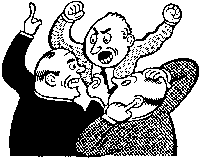Sometimes laying in hotels I get lonely for Jesus; at others I need some Rock n’ Roll
An incomplete reflection on rock documentaries
originally published in The Link I recently watched Some Kind of Monster, the documentary that chronicled two years in the life of Metallica. During those 24 months they battled their demons with the help of a ‘performance psychologist’, tried to write and record an album, suffered through a period in detox for James Hetfield, did a lot of soul searching trying to find meaning in their lives, lost their bassist (Jason Newsted) and hired another (Robert Trujillo). It’s an awesome piece of film and well worth the bottle of wine I had to share in order to see it.
I recently watched Some Kind of Monster, the documentary that chronicled two years in the life of Metallica. During those 24 months they battled their demons with the help of a ‘performance psychologist’, tried to write and record an album, suffered through a period in detox for James Hetfield, did a lot of soul searching trying to find meaning in their lives, lost their bassist (Jason Newsted) and hired another (Robert Trujillo). It’s an awesome piece of film and well worth the bottle of wine I had to share in order to see it.It got me to reflect on other music documentaries and here are seven of my faves, in no particular order.
Gimme Shelter
David Maysles & Albert Maysles
1970
The Rolling Stones were riding high in 1969 and finding their stride as a band. Brian Jones’ death had allowed Jagger and Richards to take creative control unopposed and the leadership schism within the band disappeared. After the artistic disaster of Satanic Majesty the Stones began five or six years of producing some of the best rock music ever. In 1969 they were touring to support Beggars Banquet, their first real album as the Stones, and ever mindful of outdoing the Beatles, they decided on a ‘free’ concert in Golden Gate Park, which the city fathers nixed as dangerous. So, after some tense last minute negotiations Altamont Raceway was decided on as a site.
The Maysles brothers had produced the excellent documentary Salesmen, about bible salesmen in the American South. Their style was to turn on the camera and see what happens.
And what happened at Altamont was that a 100,000 people descended to see a free festival concert and it turned into a day-long slide into The Lord of the Flies with medical emergencies, violence, rapes, seriously bad trips, dirt, cold and all manner of unplanned for events. The bands on stage, including Jefferson Airplane and the Grateful Dead, tried to keep things going, to keep the ‘summer of love’ vibe happening but this was 1969 and the darkness of the 1970s was looming. The organizers asked the Hell’s Angels, who still had some sort of rebel cachet to them, to sit on stage and to help ‘keep order’. Instead, these hairy Gestapo fucks went ape-shit for six long hours, even turning nasty towards the bands and culminating in the stabbing death of a man in front of Mick, Keith and the boys, apparently to avenge an insult to the colours.
Gimme Shelter is a slow ride to hell. Rock and roll culture at its worst – venal, self-absorbed, useless.
Let It Be
Michael Lindsay-Hogg
1970
The Beatles are arguably one of the best bands ever, a collection of four awesome talents who were able to work together to create music that had a profound impact when it was made and whose effects resonated for thirty years. Their imprint can still be heard in Karl Wallinger and World Party and in bands like Oasis.
But the true story of the Beatles is less one of a joyous pop group sent to capture the hearts of a new generation in the 1960s and more one of four men who dreamed of becoming popular musicians and ultimately regretted getting what they wished for. Their spirits were driven into the ground by screaming fans, incessant demands on their attention, the need to live in hotels for eight months out of twelve while on tour. Ultimately they couldn’t even enjoy playing their own music because they couldn’t hear themselves.
So, after enduring the deaths of Brian Epstein and the break-up of two of their marriages and worried about the imminent disintegration of the band (Sgt Pepper was recorded with never more than a combination of any two Beatles at a time in the studio) the band decided on getting back to basics. They decided to record an album in the way they did in 1962, with all the Beatles in studio, playing live, working together on songs like they used to in Liverpool and Hamburg when it was fun.
But the project turned sour. The Beatles were in no mood for dicking around with each other. Ringo objected to Paul always telling him how to play drums (drumming was one of Paul’s conceits) and Paul punched him (you can see Ringo’s black-eye in one scene). John and Yoko Ono cleave to each other like orphans. George Harrison is aware of never getting respect as a songwriter but clearly doesn’t care. Paul tries to show leadership but ends instead by bleating over the course of the year.
They threw the resulting audio tapes and film in the vaults and let it be for over a year. The project was a wasted effort until Paul took the film footage and had it edited and then released. The ‘version’ of the film is clearly Paul’s. In revenge, John took the audio tapes and had Phil Spector give it his sound.
Despite the bad mood in the film – the boys are awesome and so freakin’ talented. Don’t watch Let It Be stoned on pot – it’s a bit of a downer that way. Instead throw it on the DVD player and crank the stereo.
Don’t Look Back
D.A. Pennebaker
1967
As a filmmaker Pennebaker has given us 40 years of brilliant documentaries including the fantastic, constantly compelling political film, The War Room, about Clinton’s run for the American Presidency in 1992.
But in 1965 he was following Dylan around England recording the man on his last acoustic tour as he was about to turn ‘traitor’ and play electric. (They actually yell ‘traitor’ from the crowd.) Don’t Look Back is a great film for any Dylan fan ‘cause it just allows Dylan to be Dylan – for those who find him brilliant… well, what can anyone say… but for the most part Dylan was then and forever afterwards a pain in the ass to people who just want to talk to him. He’s not a normal guy with whom you can have beers.
The Last Waltz
Martin Scorcese
1978
After 16 years on the road the five musicians known as The Band decided they wanted out and threw a good-bye party at the Filmour West with all their friends. Directed by Martin Scorcese, the The Last Waltz captures some awesome performances from Bob Dylan, Muddy Waters, Mike Bloomsfield, Neil Young, Ronnie Hawkins and, of course, from The Band.
The film is interspersed with interviews with Richard Manual, Levon Helm, Garth Hudson, Robertson and Rick Danko and includes Robbie’s recollection of Ronnie Hawkins’ encouragement to him to make a living as a musician since he would ‘get more pussy than Frank Sinatra’.
Their onstage performances are absolutely brilliant and breathtaking whether playing their own material (Up on Cripple Creek, Ophelia, The Night They Drove Ol’ Dixie Down) or playing other people’s stuff (Neil Young’s Helpless). Offstage though the members seem tired, burned out and weary, except for Robbie Robertson. They try and pull off this last concert as a true rite of passage the words of Richard Manual (“I just want to break even”) sums up their interview mood more than anything.
As a side note Robertson was the only one to experience this last concert as a passage to better things. He went on to a successful solo career, wrote music for films, and mentored other young artists, including Nellie Furtado, for the record labels. Maybe Garth Hudson did well, too. He’s been a successful session musician and is credited on a Neko Case album. However Levon Helm died of alcoholism*, Richard Manual hung himself. Rick Danko died in his sleep in 1999 after being charged with heroin smuggling in Japan.
*Actually, Levon Helm is not dead according to this website. My apologies if I alarmed Levon or his loved ones.
Concert for Bangladesh
Saul Swimmer
1972
When a famine sucked the life out of the people of Bangladesh Ravi Shankar called his friend, George Harrison, to ask about doing something to help. That something was a star-studded concert at Madison Square Gardens featuring George, Ringo, Eric Clapton, Billy Preston, Dylan, Bad Finger, Jessie Ed Davies, and Leon Russell (who steals the show) and a half dozen other lesser-knowns.
The concert footage was shot on two 16mm cameras with small magazines meaning that they often had to change stock in mid-song. The resulting footage was a 16 month nightmare to cut and sync with the sound but well worth the effort. There were two concerts that night and the film is an amalgam of both.
It was the first of many celebrity charity concerts. Concert for Bangladesh is a great film and an even better album.
UK/DK
Circa1980
The punk scene and the London skinhead scene are observed, probed, interviewed and on display in this doc from the early 1980’s. It’s a great look at a movement that appeared outwardly to be fresh and original but was, in fact, the usual down and out suspects in new gear and safety pins.
The Kids Are Alright
Jeff Stein
1979
Personally, I feel The Who is the best band in the world and Pete Townsend is my all-time favourite guitar-auteur. I’ve always understood exactly the angst he wrote about. From the beginning I knew the line from My Generation had nothing to do with age but attitude (‘I hope I die before I get old’). For several years now I’ve been meaning to rework Quadrophenia into a queer film script. Keith Moon was a demented genius, a brilliant buffoon whose drumming style perfectly suited the band. Daltrey was made to sing Townsend’s swaggering, vulnerable lyrics. Roger Entwhistle was just right for Pete’s power chords and Moon’s insane drumming. My god, I’m tearing up.
The Kids Are Alright is the story of The Who stuffed into 90 minutes; a collection of footage from different sources edited together to chronicle the essence of band from their early angry days as The Detours and The High Numbers all the way to their 1977 tour; the film ends with the ‘definitive’ concert version of Won’t Get Fooled Again. I once destroyed the light globe in my kitchen in the West End, smashing it doing the windmill during the climax of that song when The Kids Are Alright was being broadcast on the CBC.
It’s only teenage wasteland, indeed.
xoxo
M







